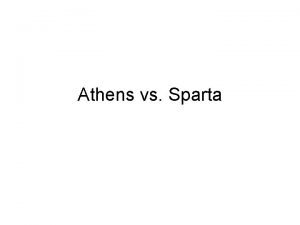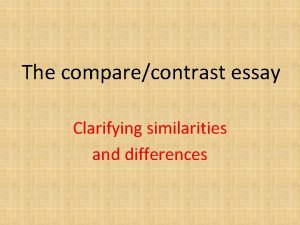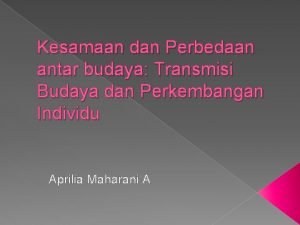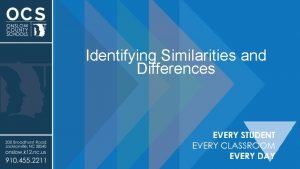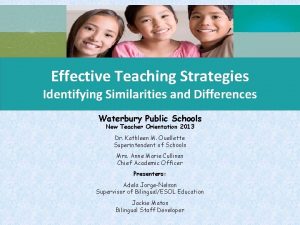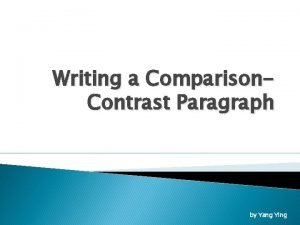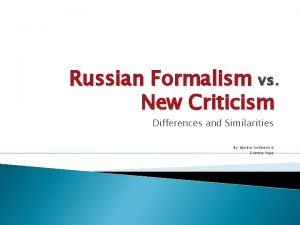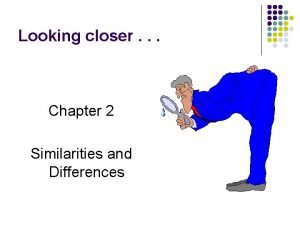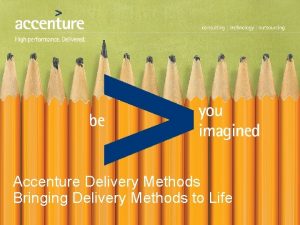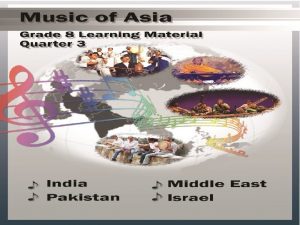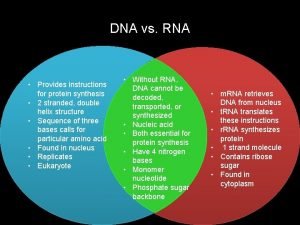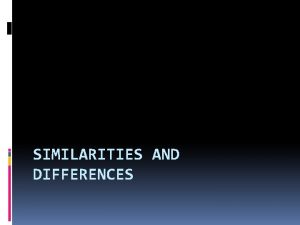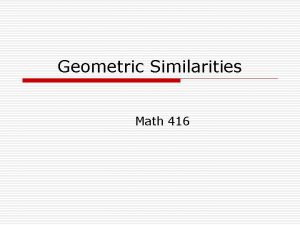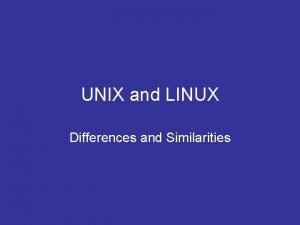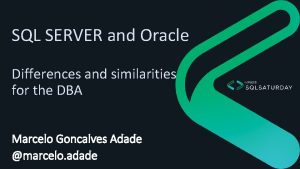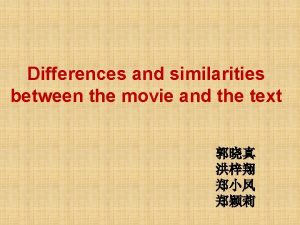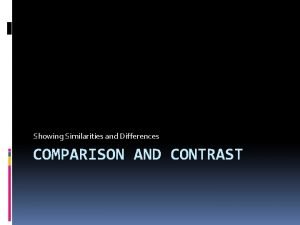Differences and similarities in the delivery of the











































![Grading of forums n Elements which are graded in a scale [0, 1]: ¡ Grading of forums n Elements which are graded in a scale [0, 1]: ¡](https://slidetodoc.com/presentation_image/cdadc9d5d18e31fb14f4d872c3d25066/image-44.jpg)
![Grading of assignments n Elements which are graded in a scale [0, 1]: ¡ Grading of assignments n Elements which are graded in a scale [0, 1]: ¡](https://slidetodoc.com/presentation_image/cdadc9d5d18e31fb14f4d872c3d25066/image-45.jpg)
![Grading of group project n Elements which are graded in a scale [0, 1]: Grading of group project n Elements which are graded in a scale [0, 1]:](https://slidetodoc.com/presentation_image/cdadc9d5d18e31fb14f4d872c3d25066/image-46.jpg)










- Slides: 56

Differences and similarities in the delivery of the modules Privacy, Ethics and Social Responsibilities and Professional Ethics Katerina Zdravkova keti@ii. edu. mk

Contents n n n Target groups Teaching materials Delivery of the module Discussion forums Assignments Global assignment Grading system Simplified grading Final grading Student feedback Conclusion

Schedule and target groups in 2007 n Novi Sad, November ’ 06 – June ’ 07: ¡ ¡ n Skopje, February ’ 07 – June ‘ 07: ¡ ¡ ¡ n Privacy, Ethics and Social Responsibilities (PESR) 21 postgraduates Philosophy of Informatics (Po. I) sixth semester 80 undergraduates at engineering 4 -year studies according to old curricula Skopje, October ’ 07 – January ‘ 08: ¡ ¡ Professional Ethics (PE) fifth semester 95 undergraduates at engineering 4 -year studies 52 undergraduates at 3 -year studies in information technologies

Schedule and target groups in 2008 n Skopje, February ’ 08 – June ’ 08: ¡ ¡ n Novi Sad, March ’ 08 – June ’ 08: ¡ ¡ n Po. I, sixth semester 12 undergraduates at educational studies PESR 4 postgraduates Skopje, March ’ 08 – September ’ 08: ¡ ¡ PESR 22 postgraduates in Skopje

Four different categories n n 47 students at postgraduate studies at both Universities (7, 5 credits) 80 students according to old curricula with 2 lectures per week (no credits) 147 students according to new curricula with 3 lectures per week (4 credits) 12 students at educational studies with 3 lectures per week (4 credits)

The syllabus n n n n Ethics: normative frameworks, values, analysis approaches. Privacy: concepts of privacy, information privacy legislative, privacy – the global perspective / privacy enhancing technologies. Trust: concepts and classification of trust; reliability. Security: information security, surveillance. Access: information access, software piracy. Property: intellectual property, ICT espionage. Social impact: social impact audit, cultural impact and ethnography, globalization. Conduct: professional conduct, codes of conduct, information risk management.

Credits n n n Syllabus definition: Katerina Zdravkova under strong supervision of Simon Rogerson and Hussein Zedan Slide preparation: Katerina Zdravkova Consultancy and discussions: Rebeca Cortazar Technical editor: Mirjana Ivanovic Logistics and devoted support: Zoran Putnik

Learning outcomes Upon successful completion of this module, the student will be able to: ¡ ¡ ¡ define the concepts of privacy and data protection within a multi-cultural and multidisciplinary context; recognise and evaluate current and future threats to privacy; outline and evaluate IS professional practice with regard to perceived professional and social responsibilities to employers and data subjects; research into an area of privacy and or data protection; integrate complex and sometimes conflicting ideas into a coherent analysis that demonstrates integrative, synoptic and analytical skills.

Particular goals of the module n n Increase the awareness of all the aspects of professional ethics Induce that these aspects are very much present in professional and in real life Critically think about privacy, ethics, and social responsibilities and their emergent influence in the new era and society Increase the awareness that we can change ourselves and influence others to behave more ethically

Delivery of all the modules n n Presentation for all the students based on the same pool of slides Examples and case studies vary depending on the student category and on the delivery period Although the module is covered with more than 600 slides, main goal is not to present them, but to encourage students to discuss, present their feelings, and to support the feelings with representative case studies. And, to be active participants in the module

Case studies for postgraduates n Directed toward their professional experience: ¡ ¡ ¡ n IT companies (why was President’s site hacked) Banks (how were credit card numbers stolen, what were the consequences, and which were the measures undertaken to prevent the repetition of this problem) Auditing company (what is the responsibly of an auditing company) Societe General (what has really happened, and how did that affect the security in Ohrid Bank) Schools (do pupils feel what is copyright) Students are more mature, questions are seriously considered, answers are precise

An interesting remark n Zoran Gligorov after one accidental reply all: “Hopefully, Google works toward connecting electronic things with the users – with the first step, they enabled us to send messages from the past, with adequate modification of message date. I do hope that with next step, they will enable us to withdraw messages back when we notice a mistake : )”

Case studies for undergraduates n Basic questions, which lead toward more specific case studies: ¡ ¡ ¡ ¡ What is ethics? What disturbs my privacy? What is security? Is information access a privilege? How do I feel when my intellectual property is stolen? What is censorship? What is professional conduct?

Answers about privacy:

Answers about property:

Specialised discussions n For students who will become future teachers, discussions are connected with the education: ¡ ¡ ¡ How should relations between pupils and students be established? Which contents should be controlled at school? What should you aware your pupils of? Are children on the Internet victims of paedophiles? … and many, many others

Undergraduates from 2006/07 n n n Group projects where students had to discover case studies connected with each topic, and then present them to others. Each group had a leader During a fortnight, they were supposed to: ¡ ¡ n make a research collect case studies present them in half page each make a slide And, they had 15 minutes to present their projects

Some case studies n n n n Security numbers and unique personal citizen number Whistle blowing Hardware risks Software risks Consequences of programming dark side Trust management systems Plagiarism most infamous cases Wiretapping Trials connected with hardware patents Trials connected with code lifting Blogs and social networks Mutual influence of ICT and real life Professionalism

Next step: discussion forums n n Enabled by Moodle Undergraduates needed some time to become disciplined, but at the end they managed to behave professionally Discussions present case studies Postgraduates carry the discussion, and afterwards prepare the reports


Some discussion topics for undergraduates in 2007/08 n n n Contemporary ethics Code of ethics of MASIT Disturbed privacy and trial epilogues How to increase your privacy? Security of your computers How reliable are your computers? Do we enter “Big brother” era? ICT enabled resolution of criminal acts Piracy financial effects Assistive technologies Information risk management

At the beginning: many subtopics

Real discussion starts

Final discussions

Benefits of discussion forums n n All students do some research They read other discussions, so the awareness increases Second important benefit is that students see their progress and progress of others And finally, they learn how to document their news

Discussions for postgraduates in Novi Sad

Discussions for postgraduates in Skopje

The broader discussion topics n n Maner: The Special Status of Computer Ethics Which IT companies didn't obey the code of ethics? Greatest privacy threats Discuss articles: ¡ ¡ ¡ n n Neumann: “Computer Security and Human Values” Stalman: “Can you trust your computer? ” Bailey, Gurak, Konstan: “Do You Trust Me? An Examination of Trust in Computer-Mediated Exchange” Evolution of privacy on the Internet How to increase security and reliability of your computer Trials connected with property infringement in ICT Privacy, security and data protection in E-voting

A typical Novi Sad forum …

and a forum in Skopje

Moderator reports n n n Subtopics in Novi Sad were determined by the teacher Each student peaks a subtopic, moderates it Subtopics in Skopje are defined by students Reason: 4 students vs. 22 students At the end, moderator makes a report which presents the topic, as well as discussions. Citation of sources and discussions is inevitable

An example of a moderator’s report

Assignments for undergraduates in 2006/07 n n n Assignments for undergraduates are always group projects Topics are defined, students do research, make an essay, and present it within 15 minutes Problems: ¡ ¡ ¡ research is done by few people, others contribute very few, or at all essays are usually too big, and too narrative citation is usually forgotten presentations do not confirm the template students are sometimes shy, and very few have presentation experience

Assignments for undergraduates in 2007/08 n n n Assignments for undergraduates are always individual projects They had only one big group project, done by in average 50 students Each week, they can peak one out of three – four different themes which is related with the topic Topics are defined, students do research, and make an essay with very limited length (between 50 -250 words) Assignments are submitted through Moodle Submission of assignments was locked, to teach students to prompt delivery

Assignments for postgraduates n Assignments for postgraduates in Novi Sad are individual: ¡ ¡ n Moderator reports Individual research Assignments for postgraduates in Skopje will be a mixture of individual and group moderator reports and research essays

Teacher’s report as a sample

Global assignment for all n n A DIARY During the whole module, students should collect current news from the media connected with the module Each news should be presented with one sentence only and supported by the sources Student selects five most important news, and makes a report with 40 to 50 lines + sources

An example of a perfect student diary (news)

An example of a perfect student diary (short essay)

Motivation and results n Intentions: ¡ ¡ n motivate students to increase their own awareness about module topics motivate students to do very a simple research teach them how to cite correctly teach them how to express themselves with limited amount of words Most students manage to fulfil all the criteria

Initial grading of postgraduates n Grading criteria: ¡ ¡ ¡ ¡ n n Promptness Quantity and quality of research Referencing Citation Self attitude Writing style Conforming delivery templates for the essay Conforming delivery templates for the slide Each grading criteria had its own sub criteria, in total, more than 25 The grade is a weighted sum of all criteria

Next step: simplified grading n Motivation: ¡ ¡ n Number of students is too big Number of assignment is too big Grades are unnecessary complex Impossible to grade them on time Improvement: ¡ Simplified grading of: n n Assignments Forums Group project Individual contribution within group project

Grading criteria for undergraduates in 2006/07 n n Determined with students The grade is: ¡ ¡ n Presence at lectures: 10% Participation at forums and results with the assignments: 40% The diary: 30% Team project: 20% Difficult task: how to grade these elements?
![Grading of forums n Elements which are graded in a scale 0 1 Grading of forums n Elements which are graded in a scale [0, 1]: ¡](https://slidetodoc.com/presentation_image/cdadc9d5d18e31fb14f4d872c3d25066/image-44.jpg)
Grading of forums n Elements which are graded in a scale [0, 1]: ¡ ¡ ¡ n n Relevancy Activity Discussion, replies to other discussions References Self attitude Number of subtopics All the sub-grades are multiplied At the end, they are normalized
![Grading of assignments n Elements which are graded in a scale 0 1 Grading of assignments n Elements which are graded in a scale [0, 1]: ¡](https://slidetodoc.com/presentation_image/cdadc9d5d18e31fb14f4d872c3d25066/image-45.jpg)
Grading of assignments n Elements which are graded in a scale [0, 1]: ¡ ¡ ¡ ¡ n n Promptness Relevancy Research Quantity Templates References Self attitude All the sub-grades are again multiplied At the end, they are normalized
![Grading of group project n Elements which are graded in a scale 0 1 Grading of group project n Elements which are graded in a scale [0, 1]:](https://slidetodoc.com/presentation_image/cdadc9d5d18e31fb14f4d872c3d25066/image-46.jpg)
Grading of group project n Elements which are graded in a scale [0, 1]: ¡ ¡ ¡ n Overall group paper Overall presentation Contribution to group project Referencing Contents of individual slide Conforming the delivery templates Again, all grades are multiplied

How do the grades look like?

But, what stands inside?

Final remarks about grading system n n Each student could have at most 45 activities An average student had about 25 activities Each activity was graded Very time consuming, but at the same time, very objective

E-testing of undergraduates in 2006/07

Multiple choice with several correct answers

Experience with e-testing n n It is difficult to define questions, and to formulate the answers Initially, students couldn’t get a good result (74 students, few students managed to pass it, the best got 73%) But, due to limited number of questions, students managed to learn them, so at the third testing, some students got 100% Consequence, e-testing is no longer used

Student feedback n n Postgraduates in Novi Sad were very happy They complained that grading was not prompt, so this year, all the activities are graded at most 12 hours after the submission deadline Undergraduates in Skopje in 2007/08 were impressed by the module, and spent hours and hours doing their research They were also very happy with the grading

Teacher’s impression n Students like the module and find it refreshing With new system, based on many discussions and many smaller assignments, they learn a lot But, grading is time consuming, and it absorbs the teacher

At last: similarities and differences Similarities n Same teaching materials n Delivery based on many discussions n Same global assignment n Great individual student contribution n Grading of discussion forums and assignment with similar grading criteria Differences n Different interpretation of teaching materials n Discussions and assignments adapted to student age and study group n Different quantity of student involvement

Conclusion n All modules ¡ ¡ rise the awareness for social and professional issues of computing initiate critical thinking attract students who are more relaxed, but learn a lot manage to teach students how to n n n do research express themselves obey predefined templates paraphrase others Student find the module useful and important Teacher is very happy, but the effort to manage all the groups and all the students is extreme
 Similarities between parents and offspring
Similarities between parents and offspring Ppst domain 4
Ppst domain 4 The ant and the grasshopper similarities and differences
The ant and the grasshopper similarities and differences Athens and sparta similarities and differences
Athens and sparta similarities and differences What is the tone of raymond's run
What is the tone of raymond's run Wid wad gad differences
Wid wad gad differences Compare contrast definition
Compare contrast definition Cross cultural differences and similarities
Cross cultural differences and similarities Identifying similarities and differences
Identifying similarities and differences Marzano similarities and differences
Marzano similarities and differences Fascism similarities and differences
Fascism similarities and differences Identifying similarities and differences activities
Identifying similarities and differences activities Although i raised marcee and obbie from puppies
Although i raised marcee and obbie from puppies Similarities and differences table
Similarities and differences table Paragraph with signal words
Paragraph with signal words Russian formalism essay
Russian formalism essay Similarities and differences table
Similarities and differences table Identifying similarities and differences
Identifying similarities and differences Similarities and differences
Similarities and differences How does adm align to the new mcq accenture
How does adm align to the new mcq accenture West asian israel arabia musical instruments
West asian israel arabia musical instruments Analogies and differences joyce and woolf
Analogies and differences joyce and woolf What is meiosis and mitosis
What is meiosis and mitosis Dna vs rna
Dna vs rna Hát kết hợp bộ gõ cơ thể
Hát kết hợp bộ gõ cơ thể Slidetodoc
Slidetodoc Bổ thể
Bổ thể Tỉ lệ cơ thể trẻ em
Tỉ lệ cơ thể trẻ em Voi kéo gỗ như thế nào
Voi kéo gỗ như thế nào Glasgow thang điểm
Glasgow thang điểm Alleluia hat len nguoi oi
Alleluia hat len nguoi oi Các môn thể thao bắt đầu bằng từ đua
Các môn thể thao bắt đầu bằng từ đua Thế nào là hệ số cao nhất
Thế nào là hệ số cao nhất Các châu lục và đại dương trên thế giới
Các châu lục và đại dương trên thế giới Cong thức tính động năng
Cong thức tính động năng Trời xanh đây là của chúng ta thể thơ
Trời xanh đây là của chúng ta thể thơ Cách giải mật thư tọa độ
Cách giải mật thư tọa độ Làm thế nào để 102-1=99
Làm thế nào để 102-1=99 Phản ứng thế ankan
Phản ứng thế ankan Các châu lục và đại dương trên thế giới
Các châu lục và đại dương trên thế giới Thơ thất ngôn tứ tuyệt đường luật
Thơ thất ngôn tứ tuyệt đường luật Quá trình desamine hóa có thể tạo ra
Quá trình desamine hóa có thể tạo ra Một số thể thơ truyền thống
Một số thể thơ truyền thống Cái miệng xinh xinh thế chỉ nói điều hay thôi
Cái miệng xinh xinh thế chỉ nói điều hay thôi Vẽ hình chiếu vuông góc của vật thể sau
Vẽ hình chiếu vuông góc của vật thể sau Thế nào là sự mỏi cơ
Thế nào là sự mỏi cơ đặc điểm cơ thể của người tối cổ
đặc điểm cơ thể của người tối cổ V cc cc
V cc cc Vẽ hình chiếu đứng bằng cạnh của vật thể
Vẽ hình chiếu đứng bằng cạnh của vật thể Phối cảnh
Phối cảnh Thẻ vin
Thẻ vin đại từ thay thế
đại từ thay thế điện thế nghỉ
điện thế nghỉ Tư thế ngồi viết
Tư thế ngồi viết Diễn thế sinh thái là
Diễn thế sinh thái là Các loại đột biến cấu trúc nhiễm sắc thể
Các loại đột biến cấu trúc nhiễm sắc thể So nguyen to
So nguyen to



